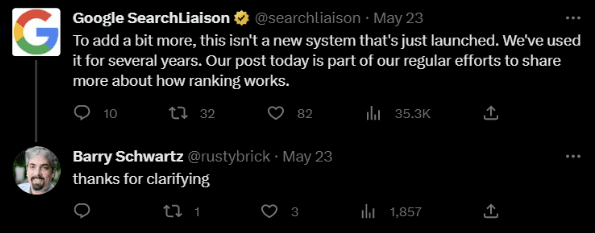Google Search Central posted a tweet on 23rd May which led to a mass misunderstanding in the SEO community.
The account shared an update to its Google Search Central Blog, saying: ‘To better surface relevant, expert, and knowledgeable content in Google Search and News, we developed a system called topic authority that helps determine which expert sources are helpful to newsy queries in certain specialised topic areas’.
To better surface relevant, expert, and knowledgeable content in Google Search and News, we developed a system called topic authority that helps determine which expert sources are helpful to newsy queries in certain specialized topic areas. Read more: https://t.co/y8G0HbqMJO
— Google Search Central (@googlesearchc) May 23, 2023
The phrasing ‘we developed a system’ appears to have thrown some people off, as they assumed the topic authority ranking factor was a brand-new system Google was announcing.
An hour later, Google Search Liaison cleared up the confusion, saying: ‘To add a bit more, this isn’t a new system that’s just launched. We’ve used it for several years. Our post today is part of our regular efforts to share more about how ranking works.’
However, the damage had already been done, with plenty of people posting on Twitter and LinkedIn about the update. People also shared their top tips for getting content to start ranking for this ‘new’ system.

What led to the misunderstanding?
Google has a guide to its search ranking systems on its Google Search Central Blog. However, topic authority doesn’t currently appear there as a ranking factor.
One Twitter user called out Google Search Liaison, saying: ‘Is this a ranking system? If so, should it be listed on [the blog]?’
Search Liaison replied: ‘It will be in the near future. That page will be periodically updated.’

So what’s going on?
Google has been using Topic Authority as a ranking factor for a while. Those embroiled in content SEO day-to-day will have been aware of it for a while.
However, they never publicly announced the system was in use – until the other day, when they acknowledged its presence by explaining more about it on their Search Central Blog.
What is topic authority?
Google uses a range of factors to understand the level of expertise a publication has on specific topics.
For example, they will prioritise local news publications if they are writing about local coverage. They will also examine the influence a story has, and work out how many sources have cited the original.
The system will also examine the publication’s history of high-quality reporting, as well as recommendations from external sources. For example, if the publication has received journalistic rewards or is quoted by expert sources, this indicates a positive reputation to Google.
The best way to achieve success with topic authority is, as Google put it, to ‘do exactly what their publications would normally do: provide great coverage about the areas and topics they know well.’
Why is Google only talking about it now?
Google is making some major changes at the moment, most notably revealing the launch of its Search Generative Experience.
It is also carrying out less publicised updates, such as the announcement of a new Core Web Vital, INP.
The search giant has chosen to make its topic authority ranking system public now for a reason.
There are ways the system ties in with SGE. On the Search General Blog about Topic Authority, Google states that the system was developed ‘to better surface relevant, expert and knowledgeable content in Google Search and News’.
In other words, Google is starting to really ramp up its prioritisation of UGC, or user-generated content. More specifically, those with genuine experience and authority in a specific topic will be given prominence in the SERPs.
There is a marked difference between genuine authority – those who have spent years reporting on local events for their regional newspaper, or a finance professional who provides thought leadership, for example – and perceived authority; those who can create evergreen content which ticks all of the SEO boxes.
Google’s upcoming SGE can be interpreted as a response to the rise in ‘perceived authority’ content which tools like ChatGPT are facilitating. Many non-experts are using AI to roll out ‘expert’ content at scale, but it isn’t providing anything genuinely useful to readers.
It makes sense that, as part of testing SGE in Search Labs, Google is ensuring its topic authority system is clearly defined and aligned with their generative AI model.
But, unless you’ve been living under a rock for the last few years, it’s pretty obvious that topic authority isn’t a brand-new phenomenon. It’s just been invisible – until now.
Need help with Topic Authority?
If you’d like more help with how you can utilise Google’s Topic Authority update, get in touch to see how we can help.
Alternatively, a great way to give your whole strategy and address any concerns is with our Free Acquisitions Workshop. Don’t miss out and book your place today to receive free expert advice from our experienced markets, a personalised action plan, and free resources to take your strategy to new heights.












